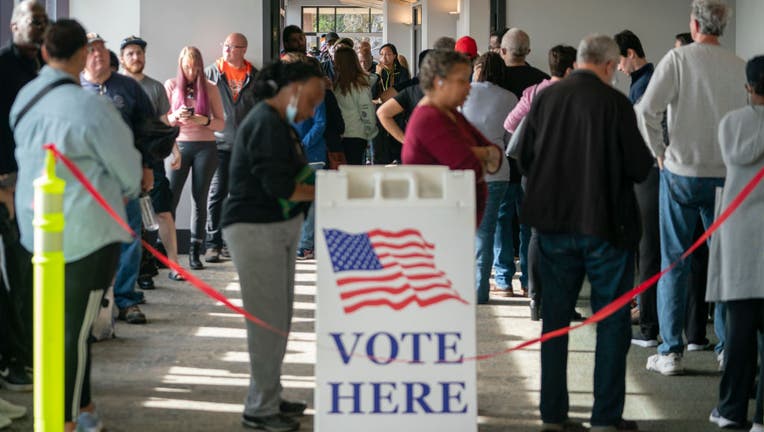Georgia senators move to ban most ranked-choice voting in the state

People are seen in line to vote on the first day of early voting in Cobb County on Saturday, November 26, 2022 in Marietta, GA. (Photo by Elijah Nouvelage for The Washington Post via Getty Images)
ATLANTA - Ranked-choice voting is barely present in Georgia, but Lt. Gov. Burt Jones and some state senators want to keep it from expanding.
Under the voting method used in some elections in other states, voters rank their choices in order. Lower-finishing candidates are then eliminated, and their votes are assigned to the surviving candidates until someone reaches a majority.
Supporters say the voting system could allow Georgia to avoid its system of runoff elections, required when a candidate doesn’t win. They say runoffs usually have lower turnouts than earlier rounds of voting, and that voters dislike them, especially Georgia’s unusual requirement for a runoff when no candidate wins a majority in the general election. Most states declare the highest finisher the winner in a general election, even if they don’t win a runoff.
But Georgia’s Senate Ethics Committee voted 8-1 Tuesday to ban the practice for all voters except for American citizens who vote absentee from abroad, sending the measure to the full Senate for more debate. Since 2021, those citizens have cast a ranked-choice ballot because it’s impractical to send a runoff ballot abroad and get it back within the four-week window for a runoff.
Republican Sen. Randy Robertson of Cataula, the sponsor of Senate Bill 355, said the practice needs to be prohibited because voters will be confused, results will be delayed, and people who only vote for one candidate will often see their vote go uncounted. He held up a ranked-choice ballot from another city and likened it to "the lottery card at Circle K where you pick your numbers."
With the backing of the lieutenant governor, the measure is likely to pass the Senate floor, but its prospects are more uncertain in the House. Florida, Idaho, Montana, South Dakota and Tennessee have previously banned ranked-choice voting.
Robertson was supported by testimony from multiple conservative groups nationwide. Their testimony focused in part on congressional elections in Alaska and Maine where Republicans had led the first round of voting but Democrats won after second-choice votes were redistributed.
"How could you rightfully have a congressional election where someone of that persuasion won or advanced when you had a state that went so far in the other direction in the presidential election?" Jordan Kittleson of the America First Policy Institute asked about the Alaska election. He called ranked-choice voting "a confusing, chaotic system whereby the person with the most votes doesn’t always win."
But former state Rep. Scot Turner, a libertarian-leaning Republican, said voters aren’t confused by ranked-choice voting and argued Georgia’s current runoff system is costly, with fewer voters returning to cast additional ballots.
"At a minimum, we don’t know who our winner is for a month, and we have to pay for it, $75 million, and we have a half-million people silenced by that process," Turner said.
He also questioned, if the method was so terrible, why it was acceptable for soldiers overseas to use it.
"If ranked-choice voting is so bad, why are you subjecting our men and women in uniform to something that is confusing and would disenfranchise them?" Turner asked.
Republican Wes Cantrell, another former state House member, called the opposition "spin and misinformation."
He said that if Georgia voters had a second choice in 2020, Donald Trump would have won Georgia’s presidential vote, and Republican David Perdue might have retained his U.S. Senate seat. He instead lost a runoff to Democrat Jon Ossoff.
"RCV is not a partisan issue," Cantrell said. "It doesn’t benefit Democrats or Republicans. It represents taxpayers and voters."
He said that voters hate runoffs. "The process is flawed and it’s because we wear our voters out," Cantrell said.

